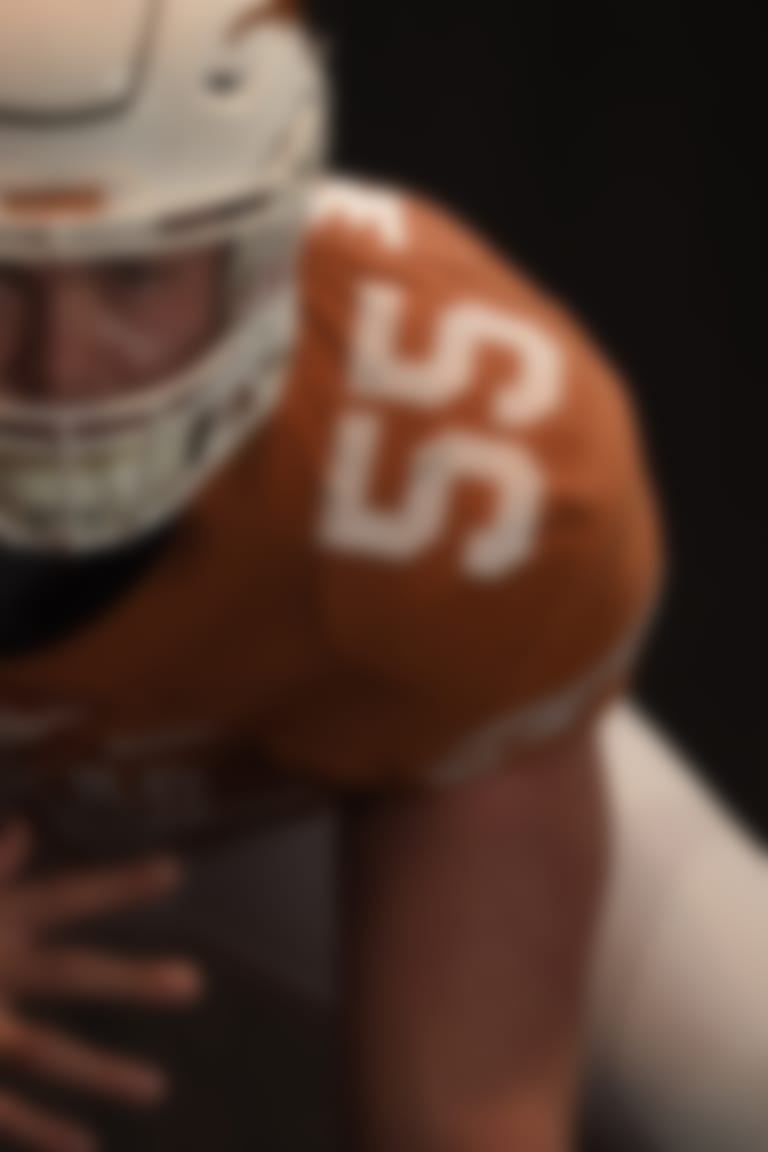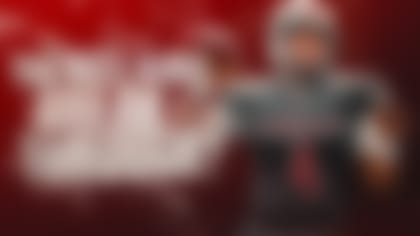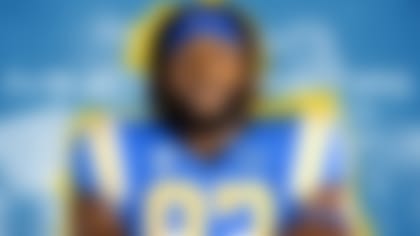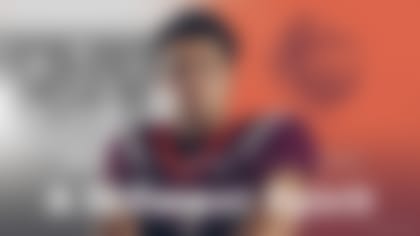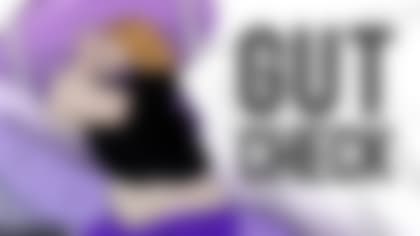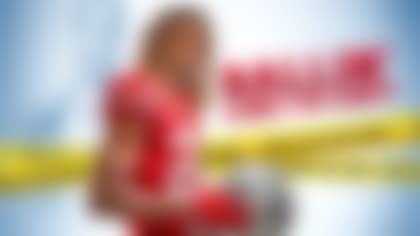By Conor Williams | Published Dec. 21, 2017
Darkness cannot drive out darkness; only light can do that.
Hate cannot drive out hate; only love can do that.
-- Martin Luther King, Jr.
Dear bullies of my past,
Thank you.
No sarcasm intended. No hatred. Certainly, no anger.
Just a simple thank you.
Honestly, I don't know how I could have accomplished what I have so far without your teasing, without your isolation, without your rumor-mongering, your harassment, your beatings, your constant torment.
In a few months, I expect to hear my name announced at the NFL Draft. If I'm lucky enough, maybe even on the first night.
I've come a long way from those dark days.
And I truly owe it all to you.
No matter how hard I tried, I couldn't form many words in the first four years of my life. That's what my parents say anyway; being as young as I was, I don't remember exactly how long it took before I started talking. But when the words did actually start to come out, it revealed a speech impediment that followed me around like a bee on a flower in springtime.
I stuttered, stammered, and plain messed up any sound I attempted to push out of my mouth. My dad thinks I might have inherited it from him or my uncle Mike. But it didn't matter who was responsible; all I knew is that I had it and you were using it to make my life miserable.
Oh, and the Rs. How could I forget about the Rs? It wasn't about rolling them in an attempt to speak my mom's native language of Spanish; I couldn't pronounce them at all. Remember that? You laughed at me when I tried to say "girl," which always came out "gawl," which made me want to crawl under a rock and stay quiet. And many times I did.
The sad part: Because I wasn't good with words, I developed a dislike for reading. In class, I was afraid of presentations and speaking up because I knew I couldn't pronounce all the words correctly and I didn't want you to make fun of me.
But you did anyway. Walking down the halls, you pointed and laughed at the way I spoke.
As bold and outgoing as I was around my family, my speech impediment made me self-conscious about how I was viewed in public places like school. It turned me into a class clown. I just wanted to make you laugh, thinking that if I did, you would like me.
But somehow I ended up always being the joke.
Making matters worse, I was obese, fat, overweight … whatever you want to call it. And believe me, you called it just about everything.
And it wasn't just being overweight. I was naturally big for my age. Born two weeks early at 10 pounds, 5 ounces, I was always the biggest kid in class, which made me self-conscious because I didn't look like everyone else. I had a protruding stomach. I was a pumpkin.
You made me feel like I wasn't somebody I wanted to be. Looking in the mirror, I wasn't proud of what I saw. I didn't like being fat.
I remember putting a belt around my stomach and pulling it tight like a girdle. In middle school, I wore one of two outfits: a big, puffy Texas jacket that hid everything, or a football jersey with a shirt underneath. I wore them because I thought it made me look less fat.
I realize now that in a way I was bullying myself. The environment I was in – the environment you created for me – was molding the perception I had of myself.
But I don't hate you for it. And I don't entirely blame you. We were kids, and kids do some pretty dumb things.
I remember always thinking how great it would be to hang out with the "cool" kids. I used to ask some of you if I could join your group for an activity, and the answer was always the same: No!
You had no idea how much that broke my heart. As humans, we have a need for companionship. And I was left alone. All alone.
I loved football. With my size, the game my dad and brother, Dalton, played in college seemed like a natural fit. But you even tried to take that away from me.
Remember in fourth grade how you held drafts to pick teams? And how every time I was still sitting there at the last pick, humiliated knowing I would be left only to watch? You said I couldn't contribute and told me I couldn't play. So I just watched. I watched and I watched until I stopped watching altogether.
I was tired of getting hurt. The pain of going through the picks and knowing I would be last, knowing I would be the odd man out was too much to bear. After a while I was like, "This is crap." So I started walking the track every day instead of going through that humiliation.
I'm sure you never noticed.
I grew angrier with every lap. Anger from how badly I wanted to be different, how I wanted to change. How I wanted people to look at me differently. How I wanted to be liked.
You said I was the problem. The tragedy is, I believed it.
You even had the talent to take the smallest joys I had and turn them into sorrow. Remember that cool eraser I had in middle school, the round, floppy one? Remember how you pretended you liked it, too, and asked if you could see it while boarding the school bus? Perhaps not. But surely you recall what you said:
"It looks like a piece of ham. Eat it, fatty."
It got me so angry I fought back. And who ended up getting in trouble? Actually, we both did that time, but usually it was just me, the big, fat kid.
The school system teaches you to not retaliate, to walk away. In this instance, I got in trouble for standing up for myself. No wonder more than 67 percent of students believe schools respond poorly to bullying and that 1 in 4 teachers see nothing wrong with bullying and will intervene only 4 percent of the time.
I can't begin to count the times I came home from school crying. At night, I used to lie in bed, almost like a prayer, wishing I could change. Wishing YOU could change the way you saw me. Saw me like my parents did.
My mom and dad had very different approaches to my situation. Dad and I went to dinner and the movies every Saturday night and we'd even sneak a movie date in during the week if we could. He was always the person I could turn to. If plans fell through – and thanks to you, they usually did – he'd always be there, ready to go to the movies with me.
They were much more than movie dates, however; they were therapy sessions. We shared everything. He listened to me, he understood me. He even allowed me to call him Jimmy. And Jimmy knew it was what I needed to go through to be the man I was becoming.
My mom, on the other hand, wanted to fight my fights for me. What can I say, she's a mom, and as a Mexican-American, it was a double whammy. Don't mess with Latin mothers.
I felt her pain because she felt mine. She was a caring mother who didn't know what to do. It was a growth opportunity for her as well. She'd pick me up from school each day and always knew instinctively what kind of hell I had been through. She'd talk to me about it and I'd talk to her.
They were the people who helped me through my darkest times. My relationship with them is unbreakable.
They took the time to know their youngest son, but you never did. And there were plenty of opportunities.
Like the time in sixth grade when you invited me over to play airsoft wars in the backyard of one of your homes, with acres of open land near the creek. But all the fun ended when you took my pellet gun, pushed me to the ground, and started shooting at me until I cried.
Or the time two of you invited me for a sleepover in middle school, pretending to befriend me, only to beat me up, forcing my parents to come get me in the middle of the night.
Speaking of middle school, remember all the rules? I remember one in particular: Only seven to a table in the cafeteria. I was always the fourth or fifth one at the table but when the guys from the football team wanted to sit down, I knew what was going to happen because it always did, kind of like Groundhog Day. The principal would come by and say, "You've got eight, you have to kick someone out." And I was always the one who got kicked out.
I was embarrassed to sit by myself at another table, so I ate in the library.
Alone.
Rejection and loneliness can be a deadly combination.
Or it can be all the motivation needed for someone pushed to the edge to create their own change.
By the time I reached seventh grade, I had had enough of you and your bullying. I approached dad and said, "I don't want to be like this anymore." For years, he was waiting for me to say those words. He had always told me that if I ever wanted to change he would help, but he knew he couldn't force me. He let me come to that conclusion on my own.
Once I told him I was ready, he was prepared. He converted our garage into a gym. And it was impressive, with weights, chin-up bars, a big-screen TV, and a P90X workout program to guide us.
We committed to waking up at 5:30 every morning and going down to the garage to train together. We worked out, he made me breakfast, drove me to school, and then off to work he went. Every morning.
Like Groundhog Day.
I started going to the YMCA, too, running and lifting every other day. I joined a youth basketball league to work on my footwork and cardio.
I focused on the negativity to get through my sets. I saw your faces as I worked out, the curvature of your lips as the word "fatso" formed, and the laughter that made the biggest kid in the class feel so small. And I thought about what I was doing it for – to change myself into someone I wanted to be.
I was starting to see the changes in my body, too, and so, apparently, did you because things between us started to change. Maybe it was because we were older, or maybe you saw me differently. My body wasn't the only thing that was transforming; I was starting to carry myself with more confidence, too.
In eighth grade, I was even invited to my first birthday party. We traveled in a limo. It was one of the first times I remember fitting in, being social with people.
The basketball team helped me get friends, too – friends I still have today. It was a travel team so we spent a lot of time together, goofing around but also getting to really know and understand each other.
It was all new to me, and I liked it.
There's nothing quite like high school football in Texas. And being the star quarterback is everything.
That's who Dalton was, my big brother separated by seven years. The entire family – me, mom and dad, and my sister, Morgan – went to Dalton's games on Friday nights. It brought our family so much joy. You could tell how proud they were of him. He was always my role model and someone I looked up to, and still do. I always said I wanted to be a quarterback because I wanted to follow in my brother's footsteps. But my dad would have none of it.
"There will be no more quarterbacks in this family," Jimmy would say. And he was right.
I joined the Coppell High football team, to continue my training. Because my body was so lean and my stomach had disappeared (and was slightly ripped) by my sophomore year, they had me play tight end. By the end of the season, one of the starting varsity tackles got injured and I replaced him.
By my junior season, I had 38 scholarship offers on the table to some the biggest schools in the nation. In a matter of four years, I went from being the chubby kid no one wanted to be around to the cool kid on campus who needed to add weight. (How's that for irony?) And all of you suddenly wanted to be my friend.
I remember thinking, "Where were y'all when I was going through my pain? I don't need you now." You were the kids who tormented me growing up and now wanted to be my friend. But with my new confidence (and new body), I was good by myself. I didn't need you.
Because I was always much bigger than anyone in my class, I was told not to touch anyone, not to fight back. But football gave me a platform to retaliate. I finally had permission to unleash everything that was inside of me.
People say I have a mean streak on the football field. Maybe that's where I'm unleashing everything that's inside me.
I still remember the hit. It felt like a freight train. I was the newly converted tackle facing Solomon Thomas for the first time in practice. We were teammates at Coppell High, but there was nothing friendly about this meeting.
My exposure to Solomon at this point was watching his games from the stands and being amazed at his skill, athleticism, and brute strength as a pass rusher. Now I was face to face with him in practice, waiting for the whistle to blow.
After winning the first rep and feeling pretty good about myself, we were face to face again, this time Solomon was all business. The whistle blew and the next thing I knew I was flat on my back.
It showed me two things: 1) I could handle a player of Solomon's enormous ability; and 2) I had a long way to go to reach his heights.
But the multiple scholarship offers were proving it was possible, even if I was only a three-star recruit. The only one that mattered to me, though, was the one from Texas. I didn't even seriously consider any of the others. Every Texas kid dreams of putting on the burnt orange uniform, and now this had become my reality.
My three years on the 40 Acres have been some of the best years of my life. I am so thankful for the opportunity.
I dreamed of playing in the NFL but I never thought I'd make it to this level. I just wanted to contribute to the football team at UT. When I got there, I was nervous. I just wanted to work hard and earn my way. When we would throw the horns up in the huddle, I didn't want to join. In my mind, I hadn't earned that right yet to partake in this school tradition.
As a sophomore, even after earning All-America freshman honors, I was still quiet and wanted to lead by example.
Then this past year, the new coaching staff needed me to be more verbal, needed me to be more of a vocal leader. It didn't come naturally to me; if you pay close enough attention, my stutter is still present. Besides, I was always the quiet one who didn't like speaking. It was difficult for me to step up into that leader role.
But I gained confidence by seeing my teammates count on me for leadership. I didn't need their friendship, but I gained their respect.
I've learned over the years that respect is much more important, something I had twisted backward in my younger days.

